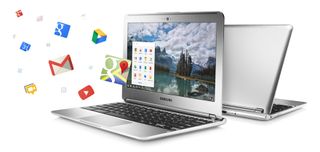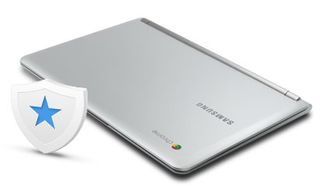IT Pro Verdict
Cheap and cheerful - the Chromebook is a bargain for those who just need a device for basic word processing tasks and to browse the web. We can see why it’s taken off in the education market. Despite it appearing to be more secure than the Android platform, we find hard to recommend the Chromebook at this time for business use as the functionality remains limited.

Google Chromebooks

Google Chromebook - Security

Google Chromebook - Thickness

Google Chromebook - Savings

Google Chromebook - Keyboard

Google Chromebook - OS

Google Chromebook - Back
Google dominates the mobile market with its Android operating system and the web giant is now gunning for the traditional laptop market with its cut-price Chromebooks.
Chromebooks have proved popular with schools, with over 2,000 educational institutions having deployed the devices globally. But is there a viable business case for these devices within the enterprise? IT Pro investigates.
Google Chrome OS
The key differentiator between Chromebooks and regular laptops is the operating system. Chromebooks don't ship with a legacy OS like Windows, but are pre-loaded with the Chrome OS, which has been developed by Google.
Getting started is easy. You sign into the system using a Google account and this allows you to sync the device with documents and email. We also like the "Guest Mode" feature. This allows friends or colleagues to log into your device with their Gmail account so they can browse the web, whilst at the same time limiting access to files which are saved in the admin account. Once a guest has signed off their data is also deleted from the Chromebook and it is as if their session never happened.

The Chrome OS is simple to navigate - it has taskbar along the bottom which allows you to access apps. Unsurprisingly, the Chromebook relies heavily on Google Apps and the Chrome browser to provide all the functionality.
Pre-installed apps include the Chrome browser, Docs, Drive, YouTube, Gmail and Maps. Google ships the device with an offline mode too, which wasn't available in the original version of Chrome OS.
People can use Google Docs whilst disconnected from the internet, and the changes will sync once you reconnect. However, to get the most out of the Chromebook, you will require an internet connection.
It is possible to download web apps via the Chrome Web Store. This does have a dedicated section for business and productivity tools. There are add-ons for Sage One and Salesforce.com available. However, if you are reliant on collaboration via legacy apps, the Chromebook is just not going to cut it as your sole content creation machine out-of-the-box.
For businesses that have virtualisation infrastructure in place, it is possible to use apps such as Citrix Receiver to run legacy apps. Again the quality of the experience will depend on the strength of the internet connection and it's not ideal if you plan on using any mission critical applications. The Citrix Receiver app available in the Web Store has a rating of just 2 stars from 117 reviews, with many users complaining of incompatibility with systems in place.
Security
Google touts security as a key benefit of the Chromebook. The firm claims that individuals and IT admins don't have to install anti-virus software as the Chrome OS has multiple layers of protection built into it.
Every application and web page is run in a sandboxed environment - so in case you do unwittingly download any malicious content it won't infect other areas of your machine. Google even claims that if a rogue piece of malware escapes the sandbox, the system will repair itself via its Verified Boot feature. This kicks in when the device is restarted, and ensures that any malware is erased.

You can also manually reset the device at any time if you are experiencing any problems. This is done using the "Powerwash" feature and takes a couple of minutes to perform, which is exponentially quicker than reinstalling Windows or Mac OS X.
The Chrome OS is updated automatically by Google on a cycle of 4-to-6 weeks, which the firm claims takes the hassle out of management. However, it remains to be seen how many IT admins will be happy to rely solely on Google for security, especially considering the Android platform is plagued with malware issues.
IT admins who do decide to take the plunge and deploy Chromebooks will be able to manage all employee devices from a single web console. They will be able to track usage on devices, create black/white lists in relation to apps, as well as control user access and network settings.